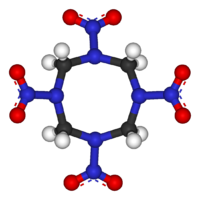HMX
 |
|
 |
|
| Names | |
|---|---|
|
IUPAC name
Octahydro-1,3,5,7-tetranitro-1,3,5,7-tetrazocine
|
|
| Identifiers | |
|
3D model (Jmol)
|
|
| ChEBI | |
| ChemSpider | |
| ECHA InfoCard | 100.018.418 |
|
PubChem CID
|
|
|
|
|
|
| Properties | |
| C4H8N8O8 | |
| Molar mass | 296.155 g/mol |
| Density | 1.91 g/cm3, solid |
| Melting point | 276 to 286 °C (529 to 547 °F; 549 to 559 K) |
| Explosive data | |
| Shock sensitivity | Low |
| Friction sensitivity | Low |
| Detonation velocity | 9100 m/s |
| RE factor | 1.70 |
|
Except where otherwise noted, data are given for materials in their standard state (at 25 °C [77 °F], 100 kPa).
|
|
|
|
|
| Infobox references | |
HMX, also called octogen, is a powerful and relatively insensitive nitroamine high explosive, chemically related to RDX. Like RDX, the compound's name is the subject of much speculation, having been variously listed as High Melting eXplosive, Her Majesty's eXplosive, High-velocity Military eXplosive, or High-Molecular-weight rdX.
The molecular structure of HMX consists of an eight-membered ring of alternating carbon and nitrogen atoms, with a nitro group attached to each nitrogen atom. Because of its high molecular weight, it is one of the most potent chemical explosives manufactured, although a number of newer ones, including HNIW and ONC, are more powerful.
HMX is more complicated to manufacture than most explosives and this confines it to specialist applications. It may be produced by nitration of hexamine in the presence of acetic anhydride, paraformaldehyde and ammonium nitrate. RDX produced using the Bachmann Process usually contains 8–10% HMX.
Also known as cyclotetramethylene-tetranitramine, tetrahexamine tetranitramine, or octahydro-1,3,5,7-tetranitro-1,3,5,7-tetrazocine, HMX was first made in 1930. In 1949 it was discovered that HMX can be prepared by nitrolysis of RDX. Nitrolysis of RDX is performed by dissolving RDX in a 55% HNO3 solution, followed by placing the solution on a steambath for about six hours. HMX is used almost exclusively in military applications, including as the detonator in nuclear weapons, in the form of polymer-bonded explosive, and as a solid rocket propellant.
HMX is used in melt-castable explosives when mixed with TNT, which as a class are referred to as "octols". Additionally, polymer-bonded explosive compositions containing HMX are used in the manufacture of missile warheads and armor-piercing shaped charges.
...
Wikipedia
